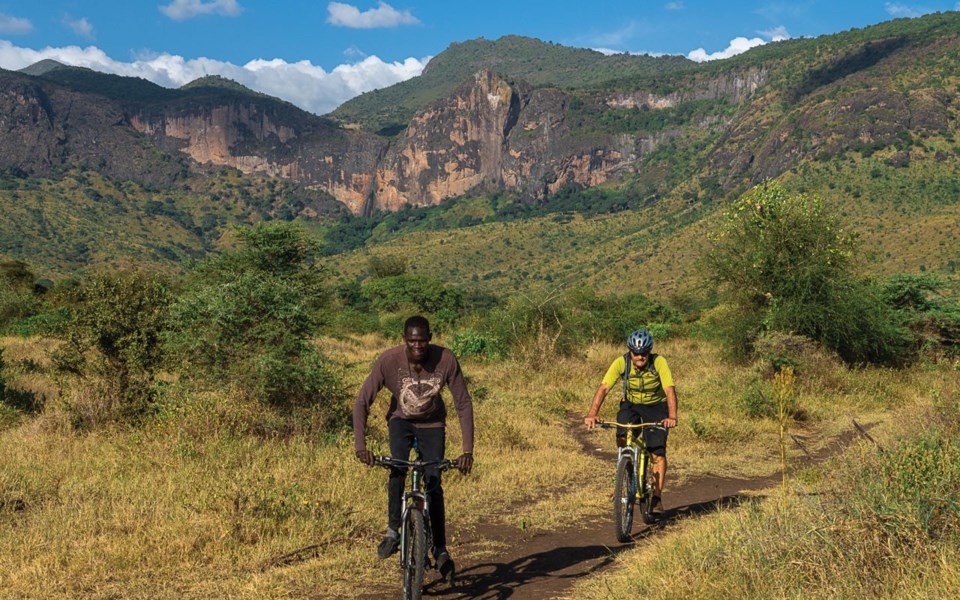Growing up around Whistler and the North Shore, Steve Andrews recalls seeing mountain biking "explode" right in front of his eyes.
Now, he's beginning to see the seeds of an industry starting to grow again—but this time, in a completely different part of the world.
This fall, Andrews was invited by fellow Whistlerite Pat Montani—co-founder of non-profit Bicycles for Humanity—to travel to Karamoja, a remote region in northeast Uganda, to help build trails for a multi-day mountain bike event.
After years of violence ended by a subsequent disarmament, "they're basically just coming up to speed with the 21st century and the rest of the world," Andrews explained. "They don't have much going on (economically), except for tourism."
The lush, 3,083-metre high Mount Moroto is "perfect dirt for building" and "amazing" terrain, said Andrews.
The biking event, the Tour of Karamoja, was co-created by Montani and Paul Sherwin, a professional road biker and commentator for the Tour de France (who, unfortunately, passed away at the beginning of December), and facilitated by Kara-Tunga Arts & Tours, a locally owned tour operator.
Andrews oversaw trail building operations, where four Kara-Tunga guides were each responsible for a crew of six workers. Funding for the project came from selling race jerseys to Tour participants, and the money enabled crews to clear about 20 kilometres of trail.
After the tour came to an end, Andrews spent three weeks educating interested locals about sustainable trail building and bike maintenance, "and then also just riding around having fun with them on the bikes to show the (potential) and what fun it is," he said.
So how did locals react to the idea of biking in their mountains? "First, they were like, 'Why would anyone want to ride uphill?' They were kind of like, 'what the heck?'
But as time progressed, "They thought it was really fun," he said. "They were motivated and excited ... There's not many people who don't enjoy riding a bike."
That spurred the idea of forming a new grassroots club and non-profit that Andrews hopes will afford locals access to mountain biking—and, more importantly, to the direct financial benefits associated with a robust, unique tourism product.
The Karamoja Mountain Bike Association, or KAMBA, was created "to advocate for mountain biking in the area and try to promote it, and also to teach (locals) trail building skills so they can build trails and hopefully promote the area for global tourism as a mountain bike destination," Andrews explained.
"I think tourism is one of the best ways (to enjoy) this symbiotic relationship where people are getting this amazing cultural experience and seeing a part of the world that's totally different to what you're used to.
"Then on the other hand, the locals are getting a (relatively) huge amount of cash. There's no real legitimate opportunities to get that amount of money in any other sort of way to that region, right now."
The organization also aims to "equalize (mountain biking) a bit and to bring ways where (the locals) can enjoy it, and there's not this huge barrier to having this expensive bike," said Andrews, adding that "it's a way for people to organize and get together, plan events, plan social rides, and eventually allocate bikes that can be lent out."
Now with Andrews back in Whistler and funding from the jersey sales used up, KAMBA is continuing its operations on the ground, with five men and one woman volunteering their time.
Looking to the future, Andrews plans to facilitate a bike drive, and open an online portal for monetary contributions. He hopes to return to Karamoja in about six months to see how the trail building is progressing, "and hopefully go with some money raised to help them further their efforts and help out wherever I can," he said. "The key is working hand-in-hand with the locals instead of saying 'OK, here's what we're going to do.'"
In a follow-up email, Andrews explained that "$25 USD pays a trail crew of six for the day and they are very happy to receive that money.
To hear more about Andrews' trip and the organization, plan to attend his Armchair Tours talk at the Whistler Public Library on Feb. 28.
For more information about the Karamoja Mountain Bike Association, get in touch with Steve Andrews at karamojabike.org.




